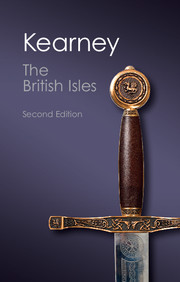Book contents
- Frontmatter
- Contents
- List of illustrations
- List of maps
- Preface to the first edition
- Preface to the second edition
- Map: the British Isles
- Introduction
- 1 The Celtic societies of the British Isles
- 2 The impact of Rome on the British Isles
- 3 The post-Roman centuries
- 4 The Vikings and the fall of the Old Order
- 5 The Norman and post-Norman ascendancy
- 6 The decline of the post-Norman empire
- 7 The making of an English empire
- 8 The remaking of an empire
- 9 The Britannic melting pot
- 10 The rise of ethnic politics
- 11 Between the wars
- 12 Withdrawal from empire
- 13 Post-imperial Britain: post-nationalist Ireland
- Afterword
- Selected reading list
- Index
1 - The Celtic societies of the British Isles
Published online by Cambridge University Press: 05 June 2014
- Frontmatter
- Contents
- List of illustrations
- List of maps
- Preface to the first edition
- Preface to the second edition
- Map: the British Isles
- Introduction
- 1 The Celtic societies of the British Isles
- 2 The impact of Rome on the British Isles
- 3 The post-Roman centuries
- 4 The Vikings and the fall of the Old Order
- 5 The Norman and post-Norman ascendancy
- 6 The decline of the post-Norman empire
- 7 The making of an English empire
- 8 The remaking of an empire
- 9 The Britannic melting pot
- 10 The rise of ethnic politics
- 11 Between the wars
- 12 Withdrawal from empire
- 13 Post-imperial Britain: post-nationalist Ireland
- Afterword
- Selected reading list
- Index
Summary
John of Gaunt in Shakespeare's Richard II speaks of
this scepter'd isle …
This precious stone set in a silver sea …
This blessed plot, this earth, this realm, this England …
These powerful lines may be seen as representing the unspoken assumption of so many historians that ‘England’ is for all intents and purposes an island. It is, of course, merely part, though now the most populated part, of the larger island of an Atlantic archipelago situated off the coast of north-west Europe. Shakespeare's poetry, however, may be taken as reflecting the almost total dominance which English culture, more properly perhaps the culture of south-eastern England, has achieved throughout the British Isles in the modern period. The typical inhabitant of the British Isles is today English-speaking (though a minority may speak Gaelic, or Urdu, at home).
The dominance of English culture marks the culmination of a complex and prolonged process, which is far from complete even today. As a historical starting point, however, it must be set on one side. For the purpose of ‘making sense’ of the history of the British Isles, we must go beyond the Anglo-Saxons and the Romans to the Celtic Iron Age, which left a lasting stamp upon the languages, place-names and cultures of these islands.
A full prehistory would need to go much further back, possibly to the mesolithic period of c. 7000 bc when human beings returned to the British Isles in the wake of a retreating Ice Age before land bridges between the islands and between Britain and the continent were finally washed away.
- Type
- Chapter
- Information
- The British IslesA History of Four Nations, pp. 13 - 26Publisher: Cambridge University PressPrint publication year: 2012



